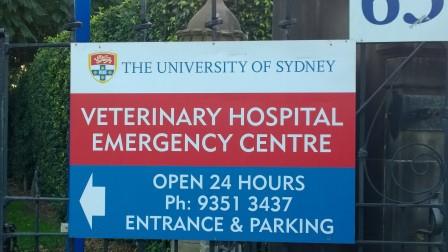Sydney Veterinary School calls for action on harmful preservatives in pet food
Continually feeding your cat pet meat runs the risk of exposing them to a thiamine (vitamin B1) deficiency and its associated serious health problems.

“In this day and age, with the knowledge that pet food manufacturers have, this is an entirely preventable condition,” said Dr Anne Fawcett, companion animal veterinarian at the Sydney Faculty of Veterinary Science.
“Sulphite preservatives are added to some pet meats, sometimes at very high levels, to mask the signs of putrefaction, giving it a longer shelf life, but long-term consumption endangers the well-being of our pets,” Dr Fawcett is lead author of an article on the issue, recently published in the Australian Veterinary Practitioner.
The article highlights a case of thiamine deficiency in a cat treated at the University of Sydney. The cat was exclusively fed a commercial, kangaroo meat pet food purchased from a supermarket. The food was tested and demonstrated high concentrations of sulfur dioxide, a known cause of thiamine deficiency in cats.
The paper was co-authored by veterinarian Dr Ye Yao and pathologist Richard Miller from IDEXX Laboratories.
Products sold as pet meat, pet mince or processed pet food rolls, which continue to be very popular with pet owners, may contain potentially harmful levels of sulphite preservatives.
“Despite awareness of the problem in Australia for over two decades, sulphite preservatives continue to be found in some pet foods at harmful concentrations. We need to ensure that the levels of these preservatives in all pet foods are regulated,” said Dr Fawcett.
“We need to manage the safety of imported and domestically produced pet meat and food.”
Animals need thiamine, also known as B1, to convert carbohydrates into energy and it also plays an important role in the production of neurotransmitters which are essential in the function of the nervous system. It is not produced by the body so has to come from food.
Tips to avoid exposing your pet to sulfides:
- Avoid feeding pet meat high in sulphides and feed a premium commercial tinned or dry food that complies with the Australian Standard for Manufactured Pet Food.
- If you do feed pet meat, vary the types and brands to reduce the overall dose of sulphides in the diet.
- If you wish to feed fresh meat, purchase meat sold for human consumption as legislation precludes the addition of these preservatives.
- You can supplement your pet’s diet with natural sources of thiamine such as pork, organ meats (such as liver, heart, brain and kidney), or even yeast, but this does not protect against thiamine deficiency if sulphites are contained in food fed at the same time.
Clinical signs of thiamine deficiency vary between dogs and cats, with more consistent and recognisable signs in cats. Early signs of thiamine deficiency include vomiting, diarrhea, loss of appetite and depression. As the condition progresses, signs may include impaired vision, a wobbly gait, head tilt or seizures. In some cases, affected animals develop a cardiac syndrome and die suddenly.
“For vets this underlies the importance of taking a full dietary history when treating an animal,” said Dr Fawcett.
“It also highlights the need for vets to have a standard reference of what are healthy levels of blood thiamine concentration in cats and dogs, which does not yet exist.”
About the Sydney Veterinary School
The Sydney DVM is an exciting new graduate-entry veterinary program, commencing in 2015. The DVM replaces the Sydney Veterinary School’s existing Bachelor of Veterinary Science, and is open to applicants with a completed Bachelor’s degree who wish to study veterinary medicine in a postgraduate learning environment. The program is internationally recognised and accredited so graduates can work around the world.
Program title: Doctor of Veterinary Medicine (DVM)
Location: Sydney, New South Wales
Semester intake: March 2015
Program duration: 4 years
Application deadline: October 31, 2014
Apply to the Sydney Veterinary School!
*

































Ask A Question
Ask us about your program of interest, or if you have a question about our services.
CONTACT US TODAY